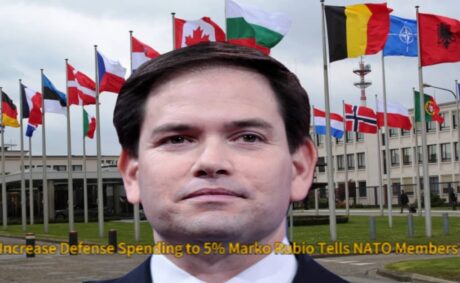U.S. Secretary of State Marco Rubio has issued a strong call for NATO members to increase their defense spending to 5% of GDP, arguing that the current 2% guideline is outdated and inadequate. Speaking at a press conference in Brussels, Rubio emphasized that the United States could no longer carry the financial burden of Europe’s defense while some of the wealthiest NATO allies fail to meet even the minimum requirements.
“These are rich countries, especially in Western Europe. They have plenty of money. They should be investing that in their national security, and they’re not,” Rubio stated. His remarks reflect a growing sentiment in Washington that NATO’s European members must take greater responsibility in financing their own defense, especially amid rising global threats.
Marco Rubio Warns Against Complacency
Marco Rubio cautioned NATO allies against falling into a false sense of security, stressing that the world has changed dramatically since the alliance’s 2% spending target was established. He pointed to mounting threats from Russia, China, and Iran as justification for the significant increase.
“The reality is, the threats we face today are greater than they were a decade ago. NATO needs to be stronger, better equipped, and fully prepared to meet these challenges. That means more investment,” Rubio asserted. He added that NATO members must prioritize military readiness over political hesitation, suggesting that failure to act decisively could weaken the alliance.
European Allies React with Division
Marco Rubio’s proposal has received a mixed response from European leaders, with some expressing outright skepticism. German Chancellor Olaf Scholz dismissed the 5% target as “unrealistic” and suggested that NATO should focus on meeting the current 2% goal before considering any increase.
In contrast, Polish and Baltic leaders have shown greater enthusiasm for the idea. “We understand the reality of today’s threats. Poland is already increasing its defense budget, and we believe other NATO members should follow suit,” said Polish Defense Minister Władysław Kosiniak-Kamysz. Estonia’s Prime Minister Kristen Michal echoed this sentiment, calling Rubio’s proposal “a necessary step in strengthening NATO’s deterrence.”
Marco Rubio Pushes for Urgent Action
Rubio emphasized that the increase should not be a long-term ambition but an immediate priority. He warned that if NATO members failed to act, the U.S. might reconsider its commitment to the alliance.
“We cannot afford to wait years for our allies to take defense seriously. The threats are here now. NATO must act now,” he declared. Rubio hinted that the United States could redirect its focus elsewhere if Europe did not rise to the occasion, a stance that echoes former President Donald Trump’s calls for burden-sharing within the alliance.
Economic Hurdles and Strategic Considerations
While Rubio’s argument resonates with some NATO members, economic experts warn that such a drastic increase in defense spending could strain national budgets. A report from the Stockholm International Peace Research Institute suggests that countries like France and Germany would face significant financial challenges in meeting the 5% threshold without cutting social programs or increasing taxes.
Nevertheless, Rubio dismissed these concerns, stating, “National security is not optional. If governments can find money for social initiatives, they can find money to protect their people.” His remarks underscore his belief that defense must take precedence over other government expenditures.
Marco Rubio’s Vision for NATO’s Future
Rubio concluded his remarks by outlining his broader vision for NATO, stressing that the alliance must adapt to a changing geopolitical landscape. He warned that failure to modernize and invest adequately in defense could embolden adversaries and undermine NATO’s credibility.
“A strong NATO benefits everyone. But strength doesn’t come for free. It requires commitment, sacrifice, and a willingness to lead. The U.S. has done its part for decades—it’s time for others to step up,” Rubio stated. His message signals a shift in U.S. policy, placing the onus on NATO allies to share the cost of collective security more equitably.














